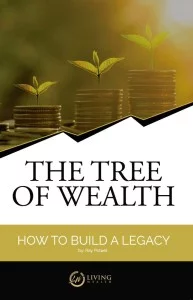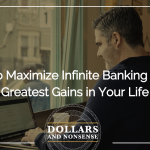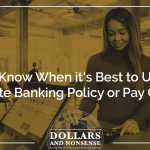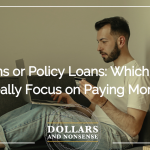Is paying cash the best option? In this episode, we will discuss how you can learn how to maximize your dollars by changing how you purchase the things you need in life.
In today’s world of finance, the Holy Grail is to get out of debt and to be able to pay cash for everything. That’s what we’re taught by all the major financial gurus, pay cash, pay cash. Get out of debt, get out of debt.
We’re not saying that’s a bad idea. But we can offer some insight into how you can improve your situation even further. That’s going to be the goal for today.
So is only using cash the best option?
The answer: it depends.
In fact, we think there are some better ways to do it.
Get Out of Debt and Paying Cash Topics Discussed:
- How can we find something else that’s better than paying cash
- What are some of the pitfalls with paying cash
- Being asset rich vs. cash Poor
- Is using cash necessarily bad
- Good debt vs. bad debt
- How to leverage debt in a financially healthy way
- Why it’s important to keep money in motion
- The real cost every time you pay in cash
Want Financial Freedom?

Start your journey to financial freedom with this first step.
Get our 122 page eBook The Tree of Wealth here now.
Cash vs. Debt Episode Takeaways:
Podcast transcript for episode 22: How to Maximize Dollars
Holly: Is paying cash really the best option? In this episode we will discuss how you can learn how to maximize your dollars by changing how you purchase the things you need in life. He’s Nate, he makes sense out of money.
Nate: She’s Holly and she helps people find financial freedom. This is Dollars and Nonsense, “If You Follow the Herd You Will Get Slaughtered”, Episode 22.
In today’s world of finance, Holly, the Holy Grail is to get out of debt and to be able to pay cash for everything. That’s what we’re taught by all the major financial gurus, pay cash, pay cash. Get out of debt, get out of debt. I’m not saying that’s a bad idea but I think we can offer some insight onto how you can improve your situation even further. That’s going to be the goal for today. Is paying cash really the best option? I think that answer is, it depends. In fact, I think you and I can even come up with some better ways to do it. So, Holly, what are we talking about here? How can we find something else that’s better than paying cash? What are some of the pitfalls with paying cash?
Holly: Some of the pitfalls with paying cash are you’re asset rich, cash poor. So, you might have the assets but you have no cash to do anything with. You also take that cash and you give it away to somebody else and you lose the buying power of that cash and you lose the interest that cash could have created. The other thing is, is that with cash, you’re giving stronger dollars away for depreciating assets that as soon as you … I’m gonna take a car, you drive it off the lot, it depreciates and you’ve just given them this nice chunk of money and said here, you take this $20,000.00, lets say and I’m going to take the car and the car is depreciated as soon as you drive it off the lot, like I said. But then, if somebody had maybe financed it over five years they gave them that $20,000.00 plus over five years. You lost five years of $20,000.00. That $20,000.00 today in 2017 is not going to be worth as much as it is in 2022.
Really, the reality is, why are we paying cash for things? Is it just because that’s what we’ve been told to do or is there a better solution? It goes back to what other options are there? Can we do something differently? I know some people are like, “Don’t finance,” because we’re told we don’t want to be in debt, that debt is a bad thing but debt always isn’t a bad thing. At least with debt normally, there is a systematic approach to a car payment that you actually are paying that every month over a period of time versus when we pay cash for the car, when we have a little extra money we are putting it away but it’s not a systematic approach to saving. We’re just saving sporadically for the next car we have to buy versus systematically.
Nate: I’m not here to say that paying cash is necessarily bad. To be honest with you, a lot of people could really use some education and some discipline to get to that point because they’re just up to their eyeballs in debt and they can’t really see a way out. That’s also a terrible idea, but I think there is a difference between bad debt and good debt. There are times when paying cash doesn’t make sense. One of the things I like to talk about in a discussion like this is, Mark Zuckerberg, the founder of Facebook … I saw this article many years ago, early on in Facebook’s IPO essentially, when it was really big news. He had just become the worlds youngest billionaire under 30, or something like that. He’s a frugal guy apparently, for the most part.
I know, his frugalness is probably different than yours but I believe his house, and people may go correct me if I’m wrong, but I’m trying to remember off the top of my head. I think it was six or seven million dollar home. Sounds like a really expensive home but it’s all relative considering the fact that he’s worth ten or fifteen billion, whatever that is. With that in mind, his financial advisors were essentially telling him, “You know, you could just pay cash for this home and owe nobody anything on this house.” But, he decided to actually go out and get a mortgage on it simply because he’s a prime customer. He got, like, a 2% interest rate. His advisors were essentially saying you should go get a loan because the banks are lending you money at such a cheap rate. It’s even below the inflation rate, essentially what they were saying. So, you shouldn’t put your capital and lock it up in this home. You should go work with it and see if you can make more with it, which is very simple to do.
Many people think I need to owe no man nothing, do that type of thinking when actually what you’re doing when you pay cash is you’re giving up the ability for that money to earn you anything. Many times that is the biggest issue with paying cash and why that? There is actually, probably better options than just simply getting rigid in your cash mentality.
Holly: It also even goes into just showing the fact of tying up those assets. You don’t want to tie up your cash. When you’ve paid the cash and you have the asset that’s all you have. You have this object and this thing but you don’t have the cash anymore. It’s a reason why there are many, many businesses that actually don’t even own their buildings anymore, because, it ties up capital, or cash, in the building itself instead of having that operating cost to use. Walmart’s one of them. They don’t own the majority of their buildings, they lease them. More and more businesses are doing that because they want the cash flow to be free.
It’s just like if you look at Universities and Medical Hospitals, that they’re leasing their MRI machines and things like that because the cost of this machine is so much that if they took the cash and bought the machine it ties up that money and they can’t use it again. Really, we want to keep your money in motion. There are some ways to do that in order to still be able to pay cash. It used to be you could pay cash and maybe get a discount. I’ll be a prime example. You used to say, “If I pay cash for this car, will you give me any type of discount?” Sometimes they would say, “yes”, sometimes they would say “no”. I asked, when I just bought my car at the end of January this year and they said “No, absolutely not.” We want you to finance it. We want you to finance it through our company. And so, if you bring in a check and you pay cash you don’t get any discount. So why would I give them the money just free and clear versus hey, it’s better to finance it this way than to do it.
Now, I actually paid cash but I financed it through a loan through my business. We financed it in a different way where we were the bank and that’s the key there is that we became the bank but I’m going to not just give that cash away and say bye-bye. There goes the interest of it for the next five years.
Nate: That’s, I guess, the main focus of this episode today is the fact that every time you pay cash your money stops earning for you. People get into this cycle, Holly, where they build up money, they save up, they save up, they save up, then they have enough money to pay cash for something. They liquidate it down, get back to zero and start building up again. They go back down to zero, they build up again, they go back down to zero. You and I have talked to so many people over time and we probably both are asking this question … and we focus mainly on cars, that’s something that we all have bought. We’ve asked people who pay cash for every car, people who have paid cash for some, who have financed some, people who have financed only. Everybody is ending up on that zero dollar line.
In other words, whether they paid cash or whether they financed their cars, or even a mixture, they’re both ending up with no money. The car finance guy, he simply makes payments to somebody else, he never has any money. The cash guy has money for a little while until he spends it again. Has a little bit of money again until he spends it again and they both are just ending up with no money and that’s the big issue. You need to find a way to have your money continue to earn for you no matter what. That way you can be able to spend money and actually recapture it because of the growth inside the fund you’re using. One of the best places to do that is through a banking policy, which is a hybrid I would say, Holly. That’s why I say it’s the best of both worlds because you essentially get like you just said, Holly. You walked in and you did pay cash but when you paid cash you got the money from your life insurance policy. Did your money actually ever stop growing for you?
Holly: No, my money kept growing at my guaranteed rate and I still got the car I wanted and now I’m making payments back to myself.
Nate: You’re the bank. No payments to somebody else. That’s the big issue is some people say, “I paid cash because I don’t like having payments.” Well, I agree with that but I can tell you one thing, making payments back to yourself is a lot easier than making payments back to other people. If you can actually pay cash for things, which we like to do, and have your money still earn for you even when you paid cash, now you’re living at the best of both worlds. That really is, to me, the best option for people these days is to figure out ways not to lock money up in assets but to turn every depreciating asset into an appreciating asset by how you financed it.
Holly: We’re gonna take a short break and when we come back we’ll finish the discussion. Is paying cash really the best option.
Are you tired of being stressed about money? The Dollars and Nonsense podcast is sponsored by Living Wealth. Visit LivingWealth.com/freedom to get your free Smart Money e-book and signup for a personal wealth presentation today. Living Wealth is a family owned and operated business, which works with individuals, families and even businesses to slay the money stress dragon. Our clients receive individual coaching regarding wealth creation and how to create a retirement income. You’ll be enabled to have cash today and in the future. Since 1972, Living Wealth has been committed to educating smart people on basic money principals, to assist them in becoming debt free and finally find financial freedom. Let us help set you free. Remember to visit LivingWealth.com/freedom to receive your free e-book and even signup for an individual wealth presentation today.
Nate: If you like the work we do here, be sure to tell others what you think. Leave us a review on iTunes. You can go to LivingWealth.com/iTunes to get to the show quickly.
Holly: Once on iTunes, click on the ratings and review. Then, click the button that says “Write a Review”. Just a few nice words and a five star review is all we ask.
Welcome back to Dollars and Nonsense. So, Nate, you had just ended by saying turning every depreciating asset into an appreciating asset. For most of us that’s not even a reality and part of the reason why is because there is a truth that we have been taught that’s not really a truth. When we look at a loan and we take a loan out from a bank or the finance company for that, we look at that loan as a liability. But, to the finance company or to the bank that loan is an asset. We really have to start looking at, can we pay ourselves back and then that loan to ourselves becomes not a liability, it becomes an asset because we’re now the banker.
Nate: An asset is something that makes you money, so if you have a loan from your policy and you’re paying it back and you’re actually making more than you’re paying, that’s absolutely not a liability, that’s an asset. A loan is an asset if you’re the bank so you just need to become the bank. You can actually lend yourself the money, pay it back, make money on it and have your money continue to earn for you the entire time. You can act like the bank. You can have the benefits of financing. Remember, the benefits of financing are not having to lock up your money in something where it’s not going to earn you anything. So, you have that benefit of financing but also the benefit of paying cash that you don’t owe anybody else anything. You just owe yourself. That’s just a beautiful place to be.
Holly: When you think about that and you think about becoming your own banker and when that loan is owed to yourself … I’m gonna be really honest with you, Nate, in the sense of that payment to me, I don’t even consider it a payment as much as I consider it a deposit. It’s a deposit and growth, financial growth to my family and future generations. I’ve started to look at money a little bit differently. I’ve started to trade places with the bank. Where I, in the past, I didn’t want a loan. A loan was a bad thing. You’ve got to pay it off as quick as you can because it’s owed to somebody else. When you actually can start taking over loans for yourself and your family and you’re making those payments back to your family, which is the life insurance company, that payment back to them from that loan and your money is growing guaranteed, it is a very big stress relief.
I could have a bad couple of months and not pay that loan payment for my car. It just means it’s going to take me a couple of months longer but I could never say to the bank, “Hey, I don’t want to pay you for my car payment for three months because I just didn’t have the income I thought I was going to have coming in.” What are they gonna do? You get penalties taxed on there. You get your car repossessed. There are all these different things that could happen. And, you’ve just lost control. You no longer have that asset. If I paid cash for it I could of at least sold it, right? Even in selling it I’m getting a depreciating value for it. I’ve got to sell it as quick as possible. So, really, there are options out there. It’s just the way we need to look at money.
We have all been taught that cash is king. It’s not really even just the cash but it’s who controls the cash, who controls the money. If you’re controlling your money and you’re getting that guaranteed rate even though you’ve taken the loan out from the life insurance company, you are benefiting you and your family by paying that loan back with interest and keeping that money all within your own private banking system.
Nate: Right, exactly. That’s one of the things that people really need to understand about money itself is that we all really do want to get to the point of paying cash and we do want to get out of debt, but there’s ways out there that people are utilizing that you may just not have heard of. That’s what we’re here to try to teach at Dollars and Nonsense, is ways that people are making mistakes with their money that they really don’t have to be making.
Holly: Most of us learned about the money from our parents and our parents were told, “Don’t be in debt, pay off your debts. Pay it off as quick as you can.” What we don’t realize is that we’re doing that. We’re paying it off as quick … My dad paid off his last house in 39 months. Crazy, but he did it because his mom and dad told him it’s never good to owe somebody something. As soon as you can, you pay it off. He still says today he had this great house but he was cash poor. We couldn’t do anything. You couldn’t do anything with the house. Now you’d paid the house off and that’s great and dandy but the cash that you used to pay it off just left and you don’t get to get it back.
Nate: Exactly. We even may do a podcast, Holly, on when it’s actually a good idea to get in debt and create assets using other people’s money. I think that’d be a good one maybe next time. How to use other people’s money to build your wealth. There just needs to be understanding out there. Some people do need a kick in the rear to get out of debt but other times the main goal is, we do want you to pay cash but we don’t want you to stay on that cycle, the hamster wheel where you build up money, you pay cash and you just hover around the same amount of money as the guy who has been financing it anyway. Yours goes up and down, his pretty much stays the same but everyone is not making the money they should because they’re liquidating the money that should be growing for them.
There actually is a way, using a policy. It’s one of the best ways to leverage your money in a way that you could still get all the benefits of paying cash and still hold on to the benefits of financing, which is your money continues to grow. It really makes a lot of sense. To us, if there’s a better way out there to finance things and pay cash for things than using a policy, I’d like to know about it. I think we’d do it. I’d change my business model in no time. To me, the best way to benefit as much as we can, when we’re spending money … Not only saving money but spending it, is through using a policy. That’s why it’s called becoming your own banker. You get the benefit of being the bank, which so many people don’t understand that they can even do.
Holly: The other thing is that this benefit allows you to turn every depreciating asset into an appreciating asset and to really change places with the banker so that you are creating a sense of loans that are actually not a liability to you. They become an asset to you. Really, a great analogy for understanding this is that when you’re paying cash, you basically, it’s like digging a hole, you dug the hole, you took all the dirt out and you gave it away. Then slowly but surely you filled the hole back up and you fill the hole back up so you have the dirt you need and then you take all the dirt out again to go buy the next thing. So, really what we want you to be able to do is to continue to be able to buy those things that you were gonna pay cash for but using a life insurance policy to do this.
This is Dollars and Nonsense. If you follow the herd you will be slaughtered. For a free transcript and resources, please visit LivingWealth.com/e22.









